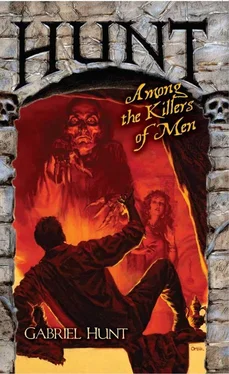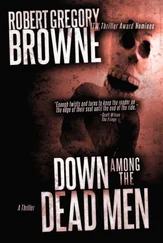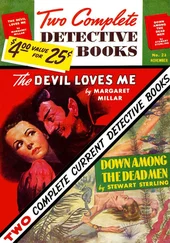The shooting ceased in a wave as Cheung’s men furiously swatted at the bats swarming over their heads. Then another wave of shooting came, mostly wild, aimed toward the ceiling.
The floor mechanism—thanks to Gabriel’s repair—was now able to do its intended job. Counterbalances clicked and cogwheeled belaying gears swung the ironbound baskets, hurling their deadly projectiles in the direction of Dinanath’s desperate men. Gabriel heard two dozen impacts, some of metal into walls or floor, but many into flesh.
Dinanath was still trying to find his footing, having fallen halfway down the dung-slick stairs as everybody went berserk. The pistol in his hand was lost to a quicksand of liquid waste as though it had disappeared through pie crust.
A wheeling bat smacked him in the face and knocked him down again.
Gabriel shut his eyes and sprinted. Five running steps, left, touch helmet of skeleton with raised sword on right-hand side, turn ninety degrees and haul ass straight out for twenty steps.
He kept his eyes shut, depending on his rehearsal in the dark to guide him according to touchpoints. Five more steps.
“Let’s just get the hell out of here,” Mitch whispered. “Please. I can get that helicopter in the air in minutes from a cold start. Whoever shot the pilot can’t be out there any longer. Let me do it.”
They could hear the thunderous sounds of gunfire below, muffled by layers of rock. “You would just leave Gabriel in there?” said Qi.
“If Gabriel’s in the middle of that, he doesn’t have a hope in hell. But we still do. We’ve got to get back to the city. Save his brother from Cheung.”
“Is that how you do it?” said Qi. “Exchange one goal for another? Your sister for his brother? Me for someone else?”
“Well, what do you think we should do?”
Qi thought for a moment. “I have confidence in Gabriel. I believe he had a plan. But,” she said, letting her eyes slide shut, “you are right. Our object must be Cheung.”
With one final glance back toward the pagoda, she came out from behind the cover that had shielded them and began to run toward the chopper.
In the harsh and uneven illumination provided by a dozen flashlights, many of which had fallen and were now casting their beams crazily into the darkness, Gabriel could see a flurry of still-circling bats and the bodies of dead men both ancient and new.
Two-thirds of Dinanath’s crew seemed to be down. The spiked metal siege balls had killed a few and bloodied several more—and the bats could smell the fresh blood. The rest were struggling to regain their footing and orientation, or firing madly, their bullets pinholing the muddy air. Panic shots bounced off the cavern ceiling or ricocheted off moist stone. Scabs of encrusted dung jumped away from the impaled corpses in their warrior drag. Near Gabriel, a warrior’s head—a featureless blunt point beneath waxy layers of droppings—was vaporized like a kicked anthill by a stray 9 mm slug.
Gabriel caught a glimpse of Dinanath. He was furiously emptying his magazine in what he must have thought was Gabriel’s direction, but he might as well have been shooting blind. One of his men, trying to claw a wriggling bat off his face, hit Dinanath from behind and the big Indian went down to hands and knees.
Falling bats pelted them like black hailstones. Other bats flew directly into the walls and dropped, unconscious or dead. The rest of the flock made for the funnel vent.
Primal fears took over. Terror of the dark, which their guns could not push back. Terror of the bats, which their guns could not track. Terror of more sharp killing objects, perhaps a second salvo of ancient metal death. Claustrophobia. Group panic, as men retreated to the sliding iron doorway only to find it cinched shut on the still-spasming arm of one of their comrades.
Dinanath was ground face-first into the sucking black mire by the panicked trampling of his own men.
Gabriel threaded himself into the vertical harness he’d left waiting the last time he’d been here, anticipating the possibility of a return under less than sanguine circumstances. He grabbed a short-handled dagger out of the scabbard at the waist of the nearest impaled skeleton, used it to saw through the anchor rope, and hauled himself toward the ceiling on his three-to-one pulley setup, which towed him at about fifteen feet per second.
Careening bats swept by him as he reached the cavern ceiling and began to corkscrew his way through the funnel. His ascent was designed to leave no dangling rope behind.
Gabriel had left himself a weapon on the eastern slope the first time he’d made this ascent, one of Qi’s LMT shortie rifles. He grabbed it now, before quickly scrambling down to the nearest of the shrine rooms.
But when he reached the room, there was no one to shoot. The sentries posted outside the idol were all facedown in pools of their own blood, sniped off by throat hits.
Gabriel hustled past two more deceased guards to the other shrine room, where he dived into the iron tub to wash away some of the foul, clotted wastes clinging to him.
When he rose, dripping, he saw a man walking toward him from the shrine room’s entrance…a man with a gun in his hand, and the gun was pointed at Gabriel.
“Hello, Mr. Hunt,” said Ivory.
Chapter 22
While the engines were spinning up, Mitch noticed the helicopter was not outfitted with any exterior firepower. Kamovs were workhorses adaptable to a number of applications, including air ambulance and search-and-rescue over land or water, but they were originally developed by the Russians as antitank choppers. Not this one. Fully stocked with armament, the machine could chew up and spit out a Cobra gunship, but this one was fangless, with not a gun or bomb in sight. At least its defensive features were still in place: the energy-absorbing seats, the beefed up landing struts, the nonfragmenting fuselage. The rotor blades were made of a composite material that could withstand a hit by a 23mm projectile and keep functioning.
“This thing is a taxi,” Mitch said as the rotors reached takeoff speed. “Stripped down for fast insertion and extraction.”
“Good,” Qi said. “We should try some fast extraction now.”
Running from their abandoned cover to the chopper, both Qi and Mitch had scanned the area for any sign—any glint of metal in the distance, any sound—that might portend imminent gunfire, but they’d reached the vehicle and the two dead bodies before it without attracting anyone’s attention. The two men had been neatly shot—but by whom? They’d put the question to one side much as they did the bodies themselves, then climbed up into the cockpit and began preparations to leave. As Mitch worked the controls, desperately forcing her hands to remain as steady as she could get them, Qi held their small arsenal of guns at the ready and watched for trouble.
But none had surfaced, and now, after readjusting her seat several times and getting the feel of the throttle, Mitch was able to float their craft into the night air. They hovered at about ten feet while she triplechecked her board. Then she seemed confident enough to loft them into the sky.
The helo accident for which Mitch had been cashiered out had occurred during a soft landing on an aircraft carrier, strictly a milk run. She was an Air Force loan-out for Naval pilot trainees, occupying the Number Two slot on the MH-60S Knighthawk when wind shear and a rolling carrier made tacking on the landing platform more difficult than her superior, the pilot, had been prepared for. They counter-rolled as the ship surged upward on the tide, and the rotor blades snapped off like popsicle sticks against the deck, gravely wounding two runway rats and scratching one chopper at a cost of about $28 million. No time was wasted in assigning a scapegoat, especially since it would boil down to a Navy versus Air Force beef.
Читать дальше












